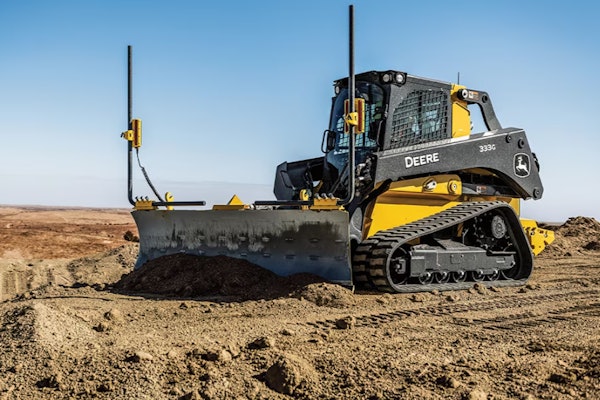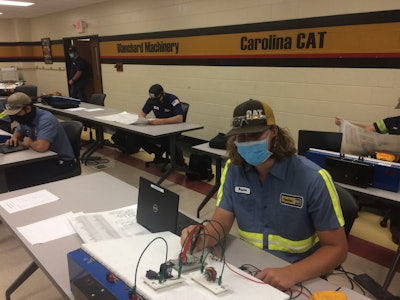
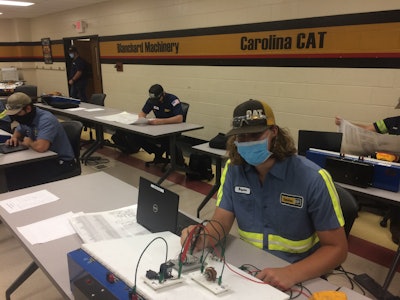 Students in Florence-Darlington Technical Community College’s Caterpillar ThinkBig program work on electrical circuits while adhering to social-distancing and mask requirements. Blanchard Machinery, Carolina Cat and Gregory Poole dealerships all hire and sponsor students in the program.
Students in Florence-Darlington Technical Community College’s Caterpillar ThinkBig program work on electrical circuits while adhering to social-distancing and mask requirements. Blanchard Machinery, Carolina Cat and Gregory Poole dealerships all hire and sponsor students in the program.With eight weeks left in the spring semester, the Diesel & Powertrain Servicing program at Milwaukee Area Technical College abruptly halted its in-person instruction and went to all virtual classes.
The program was not alone, as schools all over the country shuttered in March because of the spread of coronavirus. But the effect of the ban on in-person instruction for the diesel tech program and others like it created an additional dilemma. How are students going to learn to repair construction and other diesel equipment online?
The answer is, in many cases, they couldn’t.
“We’re very hands-on,” says Craig Kuehl, diesel instructor. “And so that’s a problem.”
To fill in that knowledge gap, the students were called back to campus in July for three weeks of hands-on shop work. And when the fall semester began, Kuehl was pleasantly surprised to see all those students, except two who took full-time jobs, return to campus.
But as it prepared for fall, the Milwaukee Tech diesel program faced another dilemma. It couldn’t meet social distancing requirements for a typical freshman class size. So it had to cut new fall enrollment from 18 to 12 students.
Again, the college was not alone.
Some technical colleges around the country are reporting lower fall enrollment to their diesel tech programs because of the coronavirus pandemic. At some schools the reductions occurred as students decided to wait out the pandemic before enrolling. In other cases, construction equipment dealers reduced the number of students they sponsor, amid furloughs and layoffs at their own businesses. And some state-sponsored institutions are facing funding cuts, which means their enrollment drop could persist into the 2021-22 academic year.
For a nation that has faced a severe shortage of diesel techs, the pandemic appears to be creating an even shallower future labor pool.
“Now, we’re going to have less people coming out of the program at the end of the semester,” Kuehl says. “So likely that will make it more challenging again for the employers to find skilled labor.”
Losing student capacity
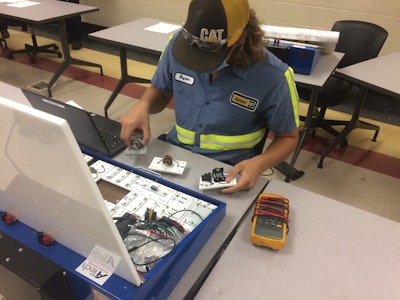 Bayden Baucom, sponsored by the Carolina Cat dealership, builds simple series circuits and checks voltage drops during lab at Florence-Darlington Technical Community College.
Bayden Baucom, sponsored by the Carolina Cat dealership, builds simple series circuits and checks voltage drops during lab at Florence-Darlington Technical Community College.For the past three years, freshman enrollment in the Cat ThinkBig program at Florence-Darlington Technical College in Florence, South Carolina, has averaged 27 students, chosen from among 150 or so applicants. This year it could only take 17 new students.
Stephen Murphey, director of the school’s Caterpillar Dealer Academy, attributes the decline to dealers temporarily reducing sponsorships of students. The dealers are facing uncertainty caused by the pandemic, as well as furloughs and layoffs during the ensuing recession. “We’ve got industry laying people off mid-corona,” he says. “And it’s hard to say, ‘Hey, I want to take a new sponsored-student slot while I’m sending someone full time home.’”
He believes that pullback will be short-lived and sponsorships will resume as the economy recovers, but his program also faces another challenge. The college has undergone campus-wide funding cuts that have also led to faculty layoffs. That means the program could suffer even longer.
“So we took a very big hit,” he says of enrollment. “We’re projected to be back up. But what’s really going to double-whammy us is the state administration is already pulling away support for faculty.”
Losing faculty means losing student capacity.
“Technicians are hard to find,” he says. “Technical instructors and technical faculty are even harder to find, and we’re losing those during this downturn. So you just don’t turn that faucet back on.”
Slower process
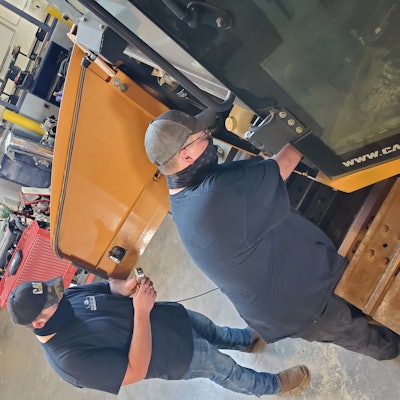 From left, Central Pennsylvania Institute students Drew Albright and Zach Rockey check and reset pump pressures on a dozer.
From left, Central Pennsylvania Institute students Drew Albright and Zach Rockey check and reset pump pressures on a dozer.“Being a hands-on training institution, typically our students don’t want to be doing online schooling,” says Andrew King, coordinator of the diesel technology program at Central Pennsylvania Institute of Science and Technology.
The private college has five students in its Case Construction Emphasis heavy diesel program, which is typical. But it has only one new student in the one-year trucking diploma program, which usually has 10 to 20. CPI was conducting in-person, hands-on labs, as of early September. But King says the drop in enrollment is due to students fearing the pandemic will end hands-on instruction.
“A lot of them are anticipating another shutdown in the fall, winter, somewhere in that range,” he says. “So they opted to actually hold their applications off until next year.”
To accommodate those students, King says, the program allowed them to defer their applications until next year.
Though the school has been able to hold hands-on instruction for the fall semester, the social distancing has posed challenges. Students are now in smaller groups, must stay at least six feet apart and wear masks.
“It does slow down the entire process, because now I have to teach the same thing twice to each group,” he says. He has employed strategies, such as having a student excelling in an area teach other students, to help move the instruction forward. The program has also rearranged its curriculum schedule to focus earlier than usual on lab work and go more in-depth into theory later.
“Because we’re all anticipating a shutdown again, we’re trying to front-load some of our hands-on stuff,” he said. “Give them a little bit of theory with it, and then really dive into the nitty-gritty theory part as we go. That way they can pick that up online if we have to.”
Concerns about student preparation
When Wake Technical Community College’s Heavy Equipment & Transport Technology program returned for fall semester, the lab was in disarray. Students at the school in Raleigh, North Carolina, had to abruptly leave in the spring while they were in the middle of working on engines.
“We had engines that had to be put back together, so students that returned were given their original engine,” says Paige Kearns, program director. “And then we spread some of the others out on the students’ engines that had graduated. But it wasn’t an ideal situation for sure.”
The school hosts John Deere construction and agricultural equipment tech programs, along with construction and heavy diesel truck programs, with a total of 70 students who come in from across the East Coast. It lost only two students, who backed out due to worries about the pandemic.
After going all virtual to finish the spring semester, the college adopted a hybrid schedule for fall, with online theory classes and in-person labs. Keeping the young students apart in lab has been an additional challenge.
“They’re like magnets; they gravitate towards each other,” Kearns says. “So we’re constantly telling them no, because ultimately what will happen is we’ll be forced out of school again.”
Academic progress has also been slower. “The social distance is a huge challenge for us,” he says. “It’s our number one enemy right now, because we’re not going to get as in depth as we typically are accustomed to.”
Kearns has reported to the advisory boards for the programs to let employers know their interns will need extra help on the job. He says the school’s industry partners are stepping up, and in some cases, students are actually getting more hands-on training than they would under normal conditions. The school’s hybrid schedule of students coming in twice a week for longer labs instead of five days has freed up more time for their internships. He adds that in a recent meeting with the program’s sponsoring dealerships, he saw overwhelming attendance, including service managers who don’t typically attend.
“So having all the service managers knowing what we’re going through and how the students are not going to be properly prepared as much as before, they were really receptive to helping them and giving them a mentor and working with them,” he says.
Hiring still occurring
Students at Oklahoma State University Institute of Technology-Okmulgee are also getting more hands-on lab work due to the flexibility of online classes, says Terryl Lindsey, dean of OSUIT’s School of Transportation & Heavy Equipment.
The programs are holding all virtual class instruction and in-person labs. The school has a large area for labs and is able to give students 60 square feet of space versus the Centers for Disease Control and Prevention’s recommended 36 square feet. As the students are spread out farther, they’re also having to increase their efforts.
“The teamwork has ceased; it’s all single work now,” Lindsey says. “So it has forced a lot of students to step up a little more than what they would.”
The university’s program has 175 students spread among Caterpillar, Komatsu Advanced Career Training, Western Equipment Dealers Association and truck technician programs. Lindsey saw a 10 percent drop in each of the Cat and Komatsu programs, but that was offset by a 20 percent rise in enrollment in the Western dealers program, giving him a full freshman class.
He attributes the drop in the two programs to students waiting out the virus. “I think it’s more of their families that are wanting to wait and see, because they’re afraid of them going out and getting it.”
Despite the recession, he has seen no layoffs of interns and has dealers wanting more graduates.
“I run a 98 percent hire rate, and I do not see that going down,” he says. “I’ve got sponsors, if they could find the students, they would take more.”
Uncertainty looms
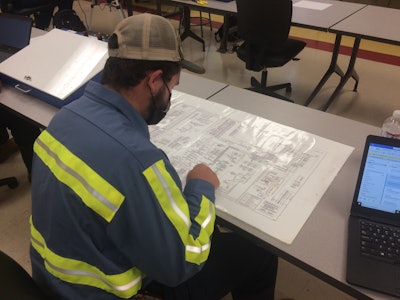 Jorden Gonzales with Carolina Cat traces wires through a schematic drawing at Florence-Darlington Technical Community College.
Jorden Gonzales with Carolina Cat traces wires through a schematic drawing at Florence-Darlington Technical Community College.Other tech schools are reporting employer demand for their students, but there is also much uncertainty.
Drew Grover, assistant professor of Caterpillar ThinkBig and diesel at Owens Community College in Toledo, Ohio, has seen freshman enrollment from an average of 30 drop to 25 this fall. The school also has a John Deere Tech program, as well as diesel truck and auto. He attributes the enrollment decline to employers furloughing workers and uncertainty about the economy. But he also believes that will end once the recession ends.
When he graduated in 2009 amid the Great Recession, he saw friends getting laid off. “But six months to a year after, they were finding that they were short on techs again,” he says.
“So because of the fact that we were short on techs before, we’re probably going to be short on them in the future.”
That sentiment is shared by other diesel tech program leaders.
“We are seeing a decline in the need for techs, but we also know that it’s going to bounce back here in no time once everything gets opened back up,” says CPI’s King.
He said he spoke with employers who were looking for techs before the pandemic but then hiring stopped as the virus took hold of the economy. He has also heard of older furloughed techs deciding to go ahead and retire.
“The tech field is definitely an aging workforce,” King says. “I can definitely see there being an issue in the next couple years of filling all those voids. But I’m hoping that also puts a spike in the training side of things and boosts enrollment because they see the need for the techs in the field.”
“In the next two to three years,” he adds, “I’m guessing there will definitely be a dire need for techs again.”
Murphey, whose program at Florence-Darlington, took a 35 percent cut in enrollment and has lost faculty also believes the industry will bounce back, but he also thinks the state and high-level school administrators facing funding cuts need to reach out more to businesses for support through this crisis and other options.
“Some of the biggest pitfalls I’m running into locally is we’re making decisions without talking to our industry partner,” he says, “…because we are running in panic mode trying to stop the bleeding.”
He reports, too, that despite the pandemic, all of his spring graduates are employed.
“My last graduating group, 80 percent of them were placed day one with their primary sponsor that they went to school with,” he says. The other 20 percent got job offers and are currently working in other areas, such as the warehouse, until a position opens on the shop floor, he says. “We’ve been blessed with high placement rates even during the middle of the coronavirus.”
The long-term outlook aside, diesel tech schools are now mostly focusing on the short-term challenges of training the next class of technicians during a pandemic.
“We’re running around with this cloud over our head not sure of what tomorrow is going to be,” Milwaukee Tech’s Kuehl says. “And so that makes it difficult because we have a very limited amount of time to get our job done anyway.
“If we get shut down, we’re just going to have to figure it out. It’s not an ideal situation, but we don’t really have any option.”








